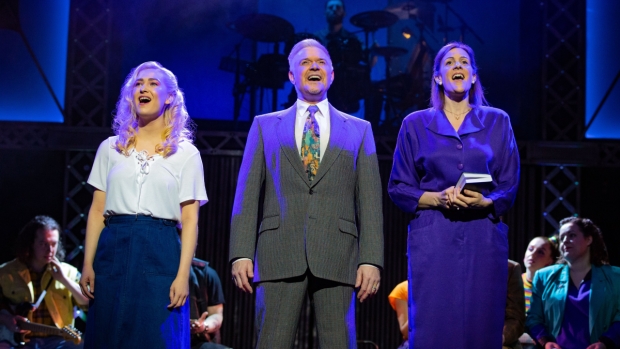Footloose the Musical 2022 tour review – a celebration of music and dance over substance
Darren Day and Jake Quickenden lead the current touring production

© Mark Senior
Imagine a world without dancing. Chicago teen Ren McCormack doesn't have to when his mother's finances force them to move in with his uncle in back-of-beyond Bomont. He's a mover and shaker — you can't stop the feet. Bomont's residents, however, live under a curfew and restrictions imposed by the minister to curb impropriety. Dance? Cancelled.
The design marks this transition with simple juxtapositions: costumes switch from shaggy denim to beige suits, cardigans and below-knee skirts. It's reflective of a simplistic narrative concerned mainly with boy troubles and a conceit essentially comparing loose feet to loose morals.
But we also see blurs between these lines. The church's crucifix is lit with the same neon bars as illuminate the signage of a burger bar, and the cast play the live music themselves, suggesting irrepressible latent desires are universal. Huge flats dominate the stage with steel frames like the domineering conservative influence. Sara Perks' design finds nifty tricks for the cramped space, like shower cubicles that revolve into school lockers. However, the costumes are so vibrant, and Chris Davey's lighting so colourful, it hardly seems a world suffering the misery of constraints on freedom.
The religious motivation also leads to strange tonal shifts between Reverend Moore's sermonising and the teens' relationships. Darren Day moves with the weight of a grieving father never loosening up and dropping his proud chest. He could do more to suggest the bite of the wounded bitterness which compelled him to shut down a whole town after the loss of his son. Likewise, Ariel's ostensibly thuggish boyfriend (Tom Mussell) never conveys a sense of threat: his supposedly menacing confrontation with Ren becomes a comic moment, lit in bright pink.
As his friend, Willard, Jake Quickenden has an enjoyable comic understanding, full of nervous gestures and eyebrows which arch in incredulity at Ren's carefree exploits. He makes his body a comic prop — his broad torso and tall posture cumbersome, carrying himself with the awkwardness of a guy who has the physique but doesn't know how to show it off by dancing. Joshua Hawkins has a contrasting loose-limbed agility in Ren's big numbers which creates chemistry, but lacks the magnetism which would enthral a whole community of students.
Its greatest asset are the songs which couldn't be much catchier. Lucy Munden effortlessly breezes through "Holding Out for a Hero". However, the show neglects the substance of its story: of protesting the right to agency and self-expression, of resisting a stereotype of irresponsible youth, better achieved by musicals like Spring Awakening. There are momentary flashes — in "Learning to be Silent", the two mothers and Ariel express their lack of voice in a row, echoing each other's notes and humming the final words, muzzled.
The show's more interested in being a celebration of music and dance, but the choreography is a little loose. In "I'm Free/Heaven Helps The Man", Hawkins has to incorporate every conceivable piece of sports equipment into his routine. Ren and Ariel's kiss, at the end of a song about the liberating feeling of love ("Almost Paradise"), is perched at the top of a steel structure which leaves the couple with nothing to do but clasp the railing.
It musters everything it can to help the audience lose themselves — a fan and smoke machine blast Jake Quickenden in metallic gold underwear. You'll feel it in your feet, it just doesn't quite have all the moves to make it more complex.












